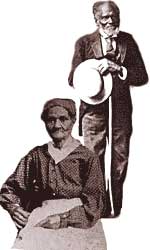12a. The Impact of Slavery

More than 140 slaves lived and worked at Andrew Jackson's Hermitage plantation in Tennessee in the 1840's
Life, liberty and the pursuit of happiness simply did not seem consistent with the practice of chattel slavery. How could a group of people feel so passionate about these unalienable rights, yet maintain the brutal practice of human bondage? Somehow slavery would manage to survive the revolutionary era, but great changes were brought to this peculiar institution nevertheless.
The world's first antislavery society was founded in 1775 by Quakers in Philadelphia, the year the Revolution began. By 1788, at least thirteen of these clubs were known to exist in the American colonies. Some Northern states banned slavery outright, and some provided for the gradual end of slavery. At any rate, the climate of the Revolution made the institution unacceptable in the minds of many Northerners, who did not rely on forced labor as part of the economic system. Northerners did not, however, go as far as to grant equal rights to freed blacks. Nonetheless, this ignited the philosophical debate that would be waged throughout the next century.
Many slaves achieved their freedom during the Revolution without formal emancipation. The British army, eager to debase the colonial economy, freed many slaves as they moved through the American South. Many slaves in the North were granted their freedom if they agreed to fight for the American cause. Although a clear majority of African Americans remained in bondage, the growth of free black communities in America was greatly fostered by the War for American Independence. Revolutionary sentiments led to the banning of the importation of slaves in 1807.
Slavery did not end overnight in America. Before any meaningful reform could happen, people needed to recognize that the economic benefit was vastly overshadowed by the overwhelming repugnance, immorality, and inhumanity of slavery.






